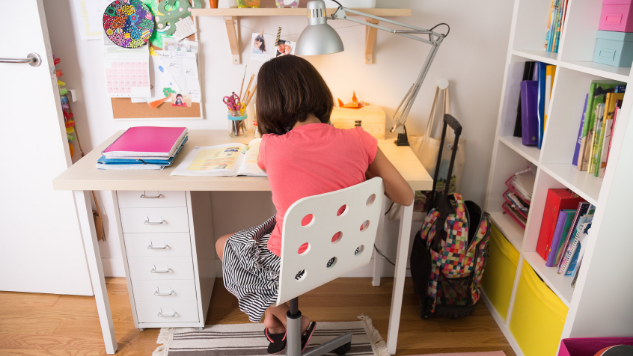How to Help Your Kids with Homework without Doing it for Them

Homework – the bane of the average child’s life and, unfortunately, frequently the bane of yours.
When it comes to homework help, you can feel akin to standing before the stern headteacher of your own youth. You can find yourself questioning its validity and why homework is important.
The debate rages on about the pros and cons of homework, but there’s no escaping the fact that right now, today, your child has to complete theirs.
Short of sending in a note stating that the dog ate it, how can you help your primary-school child with their homework without doing it for them, or without causing tears – yours or theirs?

Is Homework Compulsory?
Technically, no. Schools are no longer required to set homework and should decide for themselves what their homework policy, including amounts, should be.
The Department for Education used to dictate that Key Stage 1 children should do one hour of homework per week rising to 30 minutes a night in Key Stage 2. This was abandoned in 2012. However, you’re not getting out of it that easily.
It may not be compulsory as far as the powers that be in government say, but it may well be compulsory in terms of what your child’s teacher says. And to them, that matters. If their ‘golden time’, house points or interaction with their teacher is in jeopardy by not doing homework, to them it’s as good as compulsory.
You also may have been required to sign a Home-School Agreement. Again, whilst these are no longer a legal requirement, many schools still use them.
So really, there’s no getting out of it. It has to be done. So how can you offer homework help without actually doing it yourself?

Giving Homework Help to Your Child
We’ll come on to the pros and cons of homework in the next section of this article. For now, let’s focus on how you can ensure that homework is productive and valuable to your child. Homework can be a battle, so let’s look at how to change that.
The vast majority of homework should be about consolidating skills. Once you understand this then it can help you get motivated behind it.
A good rule of thumb is: it shouldn’t be completely new concepts. You are the support, not the teacher, so don’t feel like you have to actively teach from scratch.
If it feels like that then go and have a word with the teacher as your child may have misunderstood or need further input.
Homework can also be good as a route to following the child’s own focus and interest within a broader topic. This type of homework can be a good foundation for secondary school homework in the future.
Homework is also a good way for you being in touch with what your child is learning at school.
Predominantly, homework for primary aged children should focus on three core skills: reading, writing (and spelling) and maths.
This is where you as a parent can really make a difference. With the best will in the world, a teacher cannot spend the time actively practising these skills to consolidate and extend them as you can 1:1 with your child.
Let’s look at each of these areas and how you can help:

Reading:
Research from UCL has found that reading is more important for a child’s cognitive development than other factors such as their parents’ education level.
In fact, there is a 1 year advantage on reading performance for those kids who read for up to half an hour a day. These children go on to achieve higher results across the board in maths, spelling and vocabulary. Indeed, reading can be hugely important in improving spelling.
You’ll find, therefore, that most primary schools request that you read for around 15-20 minutes each day with your child.
That’s a tall order to fit into our busy lives. But there are some ways to help:
• Little and often is the easiest – do a little each day and build it into a regular routine.
• Don’t just read books – reading practice can be anything from reading the rules of a game to information boards on a day out.
• Take time to make it a love-filled ritual – books at bedtime with a discussion about what you like makes it a pleasure, not a chore.
• Visit the library and make it a treat.
• Use books as rewards – this way you can build your child a small library on topics that interest them.

Writing and Spelling:
A child will often develop as a writer as they develop as a reader. However, many children will bring home weekly spelling lists to learn.
The National Curriculum is now very clear about expectations for spelling – for lists relevant to the age of your child see here.
Encourage your child to write whenever and however they like. Gently reinforce basic rules of grammar. However, spellings are likely to be the main homework focus. Here are some tips for helping your child with their spelling homework:
• Little and often – again like reading, practice a little every day. This helps to cement the words.
• Practice them in a sentence – this helps the child to correctly spell the word in their writing and not just perform for the test.
• Use the Look, Cover, Write, Check method.
• Use mnemonics such as Big Elephants Can Add Up So Easily (because). Make up your own for words your child struggles with.
• Don’t use paper – write the words in playdoh, in the sand, type them out or chant the letters as walking up the stairs.
• Get your child to test you and make deliberate mistakes. Get them to mark it.
• Learn in letter steps. For example learn the first three letters, then the next three etc.
• Use spelling apps such as Word Magic.

Maths:
Maths is an area of homework which should very much be a consolidation of school learning. However, this can be tricky for parents who were taught these skills using considerably different methods.
Therefore, if your child’s school offers a workshop on how to use their methods then try to attend, or ask the teacher for a quick demo.
Maths often gets a bad rap and it’s the fear of it which makes it harder. Therefore, try to make maths homework time as positive and rewarding as possible.
Here are our top suggestions for helping with maths homework:
• Check out NationalNumeracy.org.uk and their Family Maths Toolkit (they also show you many of the current maths methods used in schools).
• Use maths wherever and whenever you can, for example weighing ingredients, telling the time, or working out the change in a shop. It’s not just about sums on the page.
• Let them make mistakes – the teacher needs to see where they are going wrong.
• Go over the method with them but let them do the actual sums.
• Take a step back if they are struggling. Reframe a similar question with smaller numbers and work up to what they actually need to do.
• Prompt with questions such as ‘what do you think you should do next?’ rather than telling them what to do.

General Homework Boosts
As well as knowing how to help with specific subjects there are some pointers for making homework a positive and valuable experience in general.
• Be clear on what needs doing and schedule in the time.
• Allocate a quiet spot with everything the child will need, including good light and the right equipment.
• Be available – not to do it for them – but to show them it’s a priority and as a guide when needed.
• Make sure they aren’t hungry, thirsty, or overly tired. Let them have a break and a snack after school before trying to get them stuck in.
• Discuss your child’s day and how this homework relates.
• Remove distractions such as the TV, background music, or even fidgety siblings.
• Don’t be tempted to give the answer or take over. The learning is often about the process, not the finished piece.
• Reward your child’s efforts as well as achievements.

When to Speak to School
Homework should be in partnership with the school. If you feel your child is spending too long on homework, getting too much, or doesn’t understand then speak to your child’s teacher. They may be able to suggest other strategies or explain which areas you should focus on.
Sometimes it may be enough to simply write a note to the teacher in the margin of their work, for example, that you helped and then the child did more sums by themselves. At other times you may need to talk directly to the teacher.

A final note
Of course, your motivation to help and support your child’s homework will largely be governed by your beliefs regarding the value of homework in itself.
The debate over the pros and cons of homework is still raging and new research is being conducted regularly in this area. But age and learning stage certainly play a part in the debate. This is particularly true with primary versus secondary school homework. Professor John Hattie, an education researcher, demonstrated that primary school homework has only a negligible effect on a student’s overall learning. However, at secondary school it is far more important.
There’s also the stress factor of homework. Homework can cause familial disagreements, time pressures, and less time for extracurricular activities. But, as with any degree of stress, this needs to be offset against the benefits.
There are a range of pros and cons of homework, but what is important is that you know how to offer the homework help that your child needs. This in itself will make the homework valuable and an enriching and reinforcing exercise for your child.
We believe your little ones deserve the very best care. That's why our local network of babysitters are personally checked and picked by our family for your family www.sitters.co.uk.
